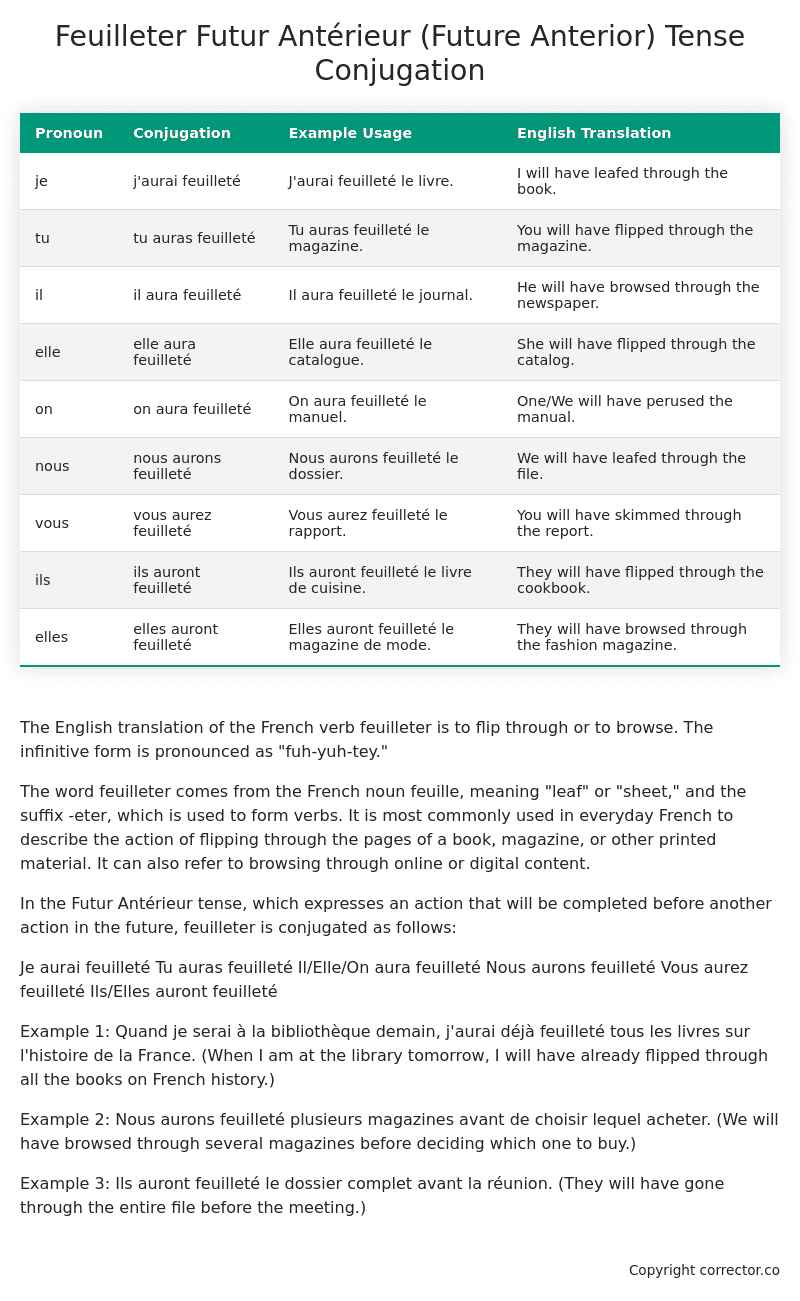Futur Antérieur (Future Anterior) Tense Conjugation of the French Verb feuilleter
Introduction to the verb feuilleter
The English translation of the French verb feuilleter is to flip through or to browse. The infinitive form is pronounced as “fuh-yuh-tey.”
The word feuilleter comes from the French noun feuille, meaning “leaf” or “sheet,” and the suffix -eter, which is used to form verbs. It is most commonly used in everyday French to describe the action of flipping through the pages of a book, magazine, or other printed material. It can also refer to browsing through online or digital content.
In the Futur Antérieur tense, which expresses an action that will be completed before another action in the future, feuilleter is conjugated as follows:
Je aurai feuilleté
Tu auras feuilleté
Il/Elle/On aura feuilleté
Nous aurons feuilleté
Vous aurez feuilleté
Ils/Elles auront feuilleté
Example 1: Quand je serai à la bibliothèque demain, j’aurai déjà feuilleté tous les livres sur l’histoire de la France. (When I am at the library tomorrow, I will have already flipped through all the books on French history.)
Example 2: Nous aurons feuilleté plusieurs magazines avant de choisir lequel acheter. (We will have browsed through several magazines before deciding which one to buy.)
Example 3: Ils auront feuilleté le dossier complet avant la réunion. (They will have gone through the entire file before the meeting.)
Table of the Futur Antérieur (Future Anterior) Tense Conjugation of feuilleter
| Pronoun | Conjugation | Example Usage | English Translation |
|---|---|---|---|
| je | j’aurai feuilleté | J’aurai feuilleté le livre. | I will have leafed through the book. |
| tu | tu auras feuilleté | Tu auras feuilleté le magazine. | You will have flipped through the magazine. |
| il | il aura feuilleté | Il aura feuilleté le journal. | He will have browsed through the newspaper. |
| elle | elle aura feuilleté | Elle aura feuilleté le catalogue. | She will have flipped through the catalog. |
| on | on aura feuilleté | On aura feuilleté le manuel. | One/We will have perused the manual. |
| nous | nous aurons feuilleté | Nous aurons feuilleté le dossier. | We will have leafed through the file. |
| vous | vous aurez feuilleté | Vous aurez feuilleté le rapport. | You will have skimmed through the report. |
| ils | ils auront feuilleté | Ils auront feuilleté le livre de cuisine. | They will have flipped through the cookbook. |
| elles | elles auront feuilleté | Elles auront feuilleté le magazine de mode. | They will have browsed through the fashion magazine. |
Other Conjugations for Feuilleter.
Le Present (Present Tense) Conjugation of the French Verb feuilleter
Imparfait (Imperfect) Tense Conjugation of the French Verb feuilleter
Passé Simple (Simple Past) Tense Conjugation of the French Verb feuilleter
Passé Composé (Present Perfect) Tense Conjugation of the French Verb feuilleter
Futur Simple (Simple Future) Tense Conjugation of the French Verb feuilleter
Futur Proche (Near Future) Tense Conjugation of the French Verb feuilleter
Plus-que-parfait (Pluperfect) Tense Conjugation of the French Verb feuilleter
Passé Antérieur (Past Anterior) Tense Conjugation of the French Verb feuilleter
Futur Antérieur (Future Anterior) Tense Conjugation of the French Verb feuilleter (this article)
Subjonctif Présent (Subjunctive Present) Tense Conjugation of the French Verb feuilleter
Subjonctif Passé (Subjunctive Past) Tense Conjugation of the French Verb feuilleter
Subjonctif Imparfait (Subjunctive Imperfect) Tense Conjugation of the French Verb feuilleter
Subjonctif Plus-que-parfait (Subjunctive Pluperfect) Tense Conjugation of the French Verb feuilleter
Conditionnel Présent (Conditional Present) Tense Conjugation of the French Verb feuilleter
Conditionnel Passé (Conditional Past) Tense Conjugation of the French Verb feuilleter
L’impératif Présent (Imperative Present) Tense Conjugation of the French Verb feuilleter
L’infinitif Présent (Infinitive Present) Tense Conjugation of the French Verb feuilleter
Struggling with French verbs or the language in general? Why not use our free French Grammar Checker – no registration required!
Get a FREE Download Study Sheet of this Conjugation 🔥
Simply right click the image below, click “save image” and get your free reference for the feuilleter Futur Antérieur tense conjugation!

Feuilleter – About the French Futur Antérieur (Future Anterior) Tense
Construction
Common Everyday Usage Patterns
Interactions with Other Tenses
For example
Summary
I hope you enjoyed this article on the verb feuilleter. Still in a learning mood? Check out another TOTALLY random French verb conjugation!


